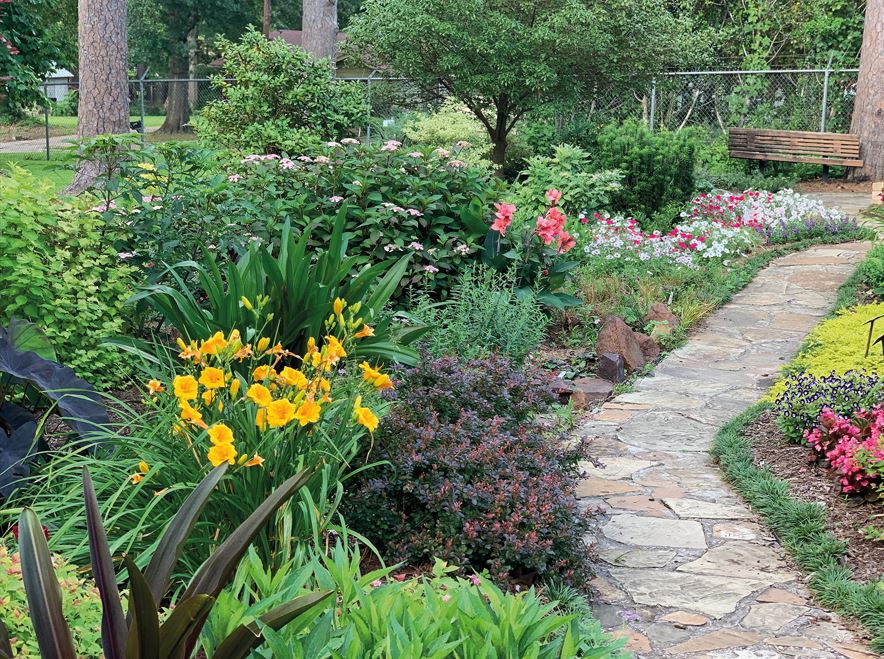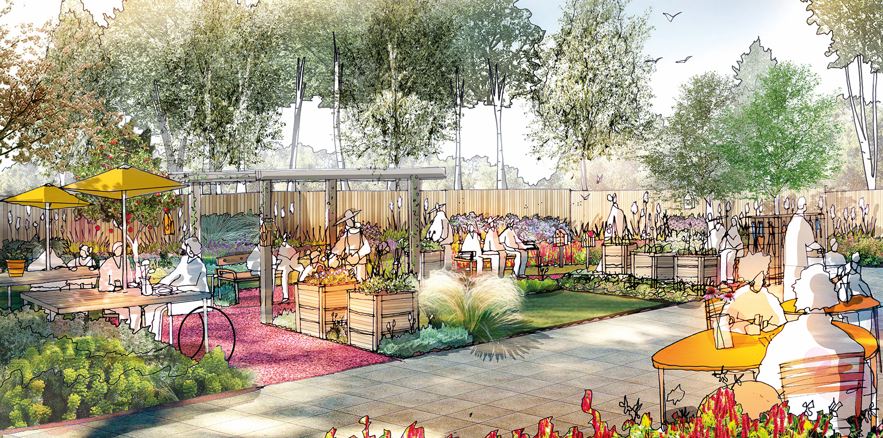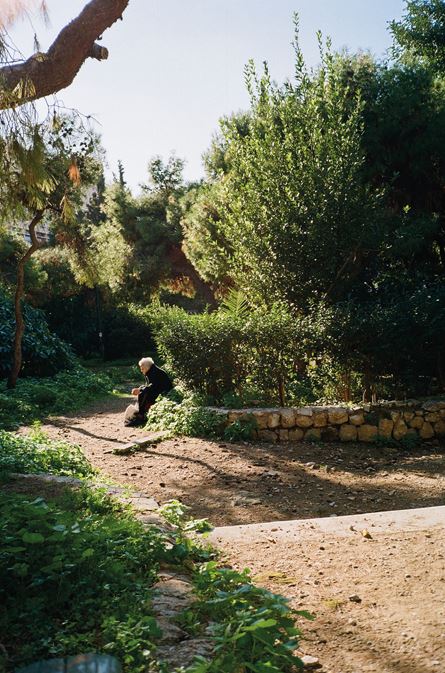
The power of well-designed public realm should not be underestimated. It holds the ability to bring people together, mitigate the impacts of the climate crisis and enhance wellbeing.
As the UK’s population ages, it’s time that landscape architects focus on leveraging public realm’s potential to combat the effects of cognitive and sensory decline by creating green spaces that empower people with dementia to lead active, healthy and joyful lives. The University of Stirling and the King’s Fund have undertaken significant research on how the built environment impacts people with dementia, including landscape design principles that we can draw from to make public realm easier to navigate, more engaging and feel safe. As visual and cognitive ability declines, some people with dementia increasingly function on a sensory level. The spaces that they thrive in are simple, clearly designed with vivid visual comfort and contrast. Best-selling author and dementia research champion Dr Wendy Mitchell shared that she “treats dementia as a game. It throws me a challenge and I solve it to try and keep one step ahead…that’s what dementia is about, a life of adapting.” Similarly, the places that we design as landscape architects should be adaptable and easy to navigate for people with dementia, whilst retaining the qualities that make green spaces joyful, engaging and mood-boosting. We can draw from a growing body of research on dementia-friendly design to achieve this. A safe, accessible and carefully planned external living environment can have significant therapeutic benefits. A well-planned garden can form part of a holistic treatment plan, providing scope for physical exercise to lessen tension and feelings of aggression, spaces for privacy and reflection, and ample exposure to Vitamin D, which is particularly important for the health of the elderly population. It should adapt to their changing needs by allowing for activities that are familiar and encourage participation – an important aspect of maintaining good physical and emotional wellbeing.
PRP’s landscape team was recently commissioned by the NHS to create a serene garden space for patients, carers and staff of the West Dereham Ward at The Queen Elizabeth Hospital in King’s Lynn, Norfolk.
The ward provides integrated care for older people and has recently undergone a comprehensive redesign to become the second dementia-friendly unit in the hospital. Designed to avoid a clinical atmosphere, the architecture and interiors incorporate a memory wall, photographs of the local area and staff and day rooms that open directly up into the garden. The Trust’s aspiration for the public realm was to create a secure, accessible garden that empowers patients with a sense of ownership and truly enrich their day-to-day lives; encouraging them to contribute to its upkeep, come together and interact with visiting family. To develop the brief, PRP held a series of co-production exercises with the Trust and local people impacted by dementia, such as members of Kings Lynn Dementia Café (which is run by the Trust’s charity partner West Norfolk Carers) and Carer’s Voice. This allowed us to ensure that the final outcome would truly reflect the needs of the people that will be using the space; a key element of PRP’s design ethos is to design with (not just ‘for’) communities. We then developed multiple concept sketches incorporating different ideas for the space’s layout and the activities it could host, whilst responding to and enhancing the garden’s existing features. The options were displayed in King’s Lynn Dementia Café, to ensure that staff, carers, patients and families all had a say in the design process, and subject to a vote. Members of the dementia café, Carers Voice, the Trust, Care of Elderly Doctors and West Dereham Ward staff all took part; this was a truly special activity that really enabled people living with dementia to contribute. A set of dementia-friendly design principles governed our developing landscape design, each of which addresses a unique difficulty experienced by someone living with dementia.

PRINCIPLE 1: ACCESS, MOVEMENT AND ORIENTATION
The garden will be accessible to all patients with level paths, clear signage and plenty of rest stops. A continuous walking route fringed by navigational trees will return patients to their starting point, so they can walk as far as they want without getting lost. With a terrace large enough for hospital beds and wheelchair-accessible tables and floors, everyone will be able to use the space.
PRINCIPLE 2: MEMORY AND MENTAL MAPPING
Our design allows year-round access to the outdoors with comfortable seating areas protected from the elements. Sensory features will stimulate memories and cognitive activity, and raised planting beds will encourage patients to garden and revive memories.
PRINCIPLE 3: SENSORY STIMULATION
The external space will provide seating for quiet contemplation, conversation and sensory stimulation. Colourful, textured plants such as sunflowers will provide visual interest for visually impaired people, whilst strongly scented plants such as lavender will act as markers and provide olfactory stimulation. Raised beds along walking routes will make the plants more accessible for gardening whilst using a wheelchair.
PRINCIPLE 4: SHELTER AND SHADE
A large pergola will be the centrepiece of the garden design, providing a shaded outdoor space for relaxation and respite. Tree planting will further increase the amount of shade on sunny days, and awnings will provide sheltered areas with seating that can be adjusted depending on the weather conditions. By adhering to these core dementia-friendly design principles, the new garden will foster independence for those with dementia, motor difficulties, visual impairments and wayfinding issues alike. Encouraging movement, exercise, socialisation and quiet reflection builds a sense of normality and structure into a daily routine, which can significantly augment a holistic treatment plan delivered in conjunction with medical support. As we look ahead, well-designed landscaped gardens will play an increasingly important role in promoting health and wellbeing for all people, not just those with dementia. As landscape architects, it is our responsibility to put these considerations at the forefront of our designs and ensure that we are creating inclusive spaces for everyone to enjoy.
